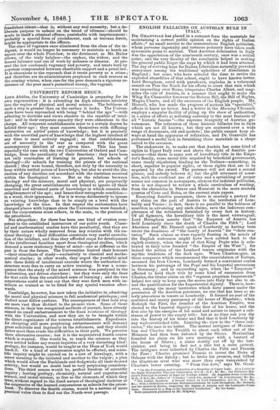UNIVERSITY REFORM BEGUN.
bus Alcides, the University of Cambridge is preparing for its own regeneration : it is extending its high education ministry into the region of physical and moral science. The boldness of such a step is greater than on the surface it looks. The Univer- sities have been reproached with being "behind the age "—with adhering to doctrine and views obsolete in the republic of intel- lect: and in their corporate capacity they were obnoxious to the charge. All corporate establishments must to a certain degree be behind their age : they must concern themselves with diffusing instruction on settled points of knowledge; but it is precisely with the unsettled parts of knowledge that the highest intellect of any time is most actively engaged ; so that establishments are of necessity in the rear as compared with the great contemporary intellect of any given time. This has been especially the case with the two Universities of Oxford and Cam- bridge, from the peculiarity of their functions : they have been not only seminaries of learning in general, but schools of theology—the schools for training the priests of the national church ; they were bound, therefore, not only by the necessity- to keep within settled points of knowledge, but also to avoid the dis- cussion of any doctrine not accordant with the doctrines received within the theological view. But as the relations between theology and the sciences, moral and physical, are perpetually changing, the great establishments are bound to ignore all those unsettled and advanced parts of knowledge in which consists the enlightenment of the age; and hence their retrograde condition— in a word, their ignorance. For it is worse deliberately to ignore an existing knowledge than to be simply on a level with the knowledge of the time. In that respect the ecclesiastics have changed places with laymen since the Universities were founded ; and the corporations must adhere, in the main, to the position of the priesthood.
Not altogether; for there has been one kind of evasion com- petent to the established instructors of our polite youth. Classi- cal and mathematical studies have this peculiarity, that they are by their nature wholly removed from any relation with the na- tional theology : their difficulties constitute very useful exercita- tion of the intellect, and thus they afforded scope for development of the intellectual faculties apart from theological studies, which demand a more stationary frame of mind—one as different as the past is from the future. The Universities limited their honours —their stimulants of study—exclusively to classical and mathe- matical studies; in other words, they urged the youthful mind into those fields of intellectual exercise where the authorized in- structors were free to carry on active training. It was a conse- quence that the study of the mixed sciences was paralyzed in the Universities, and driven elsewhere ; but they were only the freer for that exile from the established seats of learning ; and the two corporations could at least say that they sent forth men with in- tellects so trained as to be fitted for any special vocation after- wards.
Cambridge, however, has now taken the initiative in admitting the moral and physical sciences to full academical privileges ; and Oxford must follow perforce. The consequences of that bold step are more vast than distinct to the present view. Some of those sciences, in their less recognized methods of pursuit, have already Caused no small embarrassment to the fixed relations of theology with the Universities, and now they are to be brought within the direct cognizance of the veteran establishments. Expedients for obviating still more perplexing embarrassment will demand great solicitude and ingenuity in the reformers, and they should rather meet than evade the difficulties in their path. We perceive three alternative courses ; but it is the unperceived fourth course Which is wanted. One would be, to teach the sciences as they Were settled before any recent inquiries of a very disturbing kind: geology, for instance, would be taught as the Dean of York would teach it. Or a kind of compromise might be effected, and scien- tific inquiry might be carried on in a sort of hierology, with a secret meaning to the initiated and another to the vulgar ; a plan Which would allow the Bucklands and Sedgwicks all their desired activity, but would no doubt lead to very perplexing considera- hons. The third course would be perfect freedom of scientific inquiry; leaving geology, chemistry, natural and experimental Science, and moral science, as free as the elements of which they treat, without regard to the fixed nature of theological doctrine or the exigencies of the learned corporations as schools for the priest. hood. To discover the fourth course, would be a service of more practical value than to find out the North-west passage.
























 Previous page
Previous page